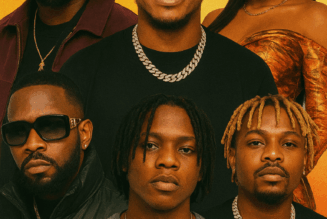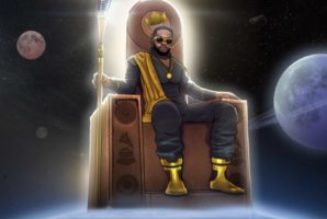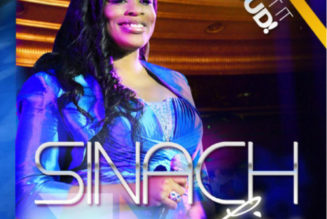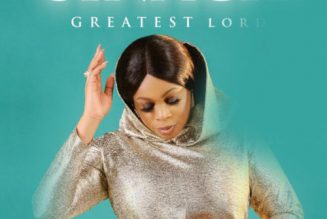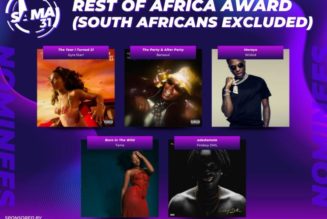As the world shut down last year, Africa’s leading gospel artist, Sinach, was expanding her coast. How did her 2015 record, ‘Way Maker’ become the comfort song of a global pandemic?
“She wants you to watch her rehearsal too,” Sinach’s A&R, Toba tells me, guiding me through the compound from a small desk office, into the larger apartment where faint, discordant music briefly escapes into the quiet neighbourhood. Inside her Lekki office apartment, Sinach stands in the centre, surrounded by a 19-piece orchestra. It’s a big rehearsal, Toba tells me. Sinach is slated for a Youtube live virtual performance over the Easter weekend. It was a marketing play to amplify her latest album, Greatest Lord, and bring new content to millions who follow her on the video-sharing platform. As it begins to rain outside in Lagos, Sinach waves her hand to her left, where 4 violinists and a cellist sat in conversation, harmonizing their strings. “Oh yeah, I like that,” she says, before humming a tune into her microphone.
Again, Sinach waves to her right. An enthusiastic backup singer belts a tune into the mic, and the whole room erupts in mild laughter. Sinach looks at the erring man, who scratches his head in mock penance, smiling.
“I’ll assume you are not prepared,” she says with a smile. The room cracks up again.
Sinach, Osinachi Kalu Okoro Egbu, 48, is the mascot of all that is good and royal in African gospel music. The faith-based Nigerian singer, songwriter and senior worship leader at globe church, Loveworld Inc, dominates African Christian music. Her lengthy career is littered with many ‘firsts.’ Sinach is the first singer-songwriter to top the Billboard Christian Songwriter chart for 12 weeks in a row. The first Nigerian musician to win the Dove Awards, after her song, ‘Way Maker’ bagged three nominations and won the Song of the Year at the 51st GMA Dove Awards. The Dove Awards can be likened to the Grammy of the gospel music industry. Her 9 studio albums have a litany of gospel hit songs, including “Way Maker”, “I Know Who I Am”, “Great Are You Lord”, “Rejoice”, “He Did It Again”, “Precious Jesus”, “The Name of Jesus”, “This Is My Season”, “Awesome God”, “For This”, “I Stand Amazed”, “Simply Devoted” and “Jesus is Alive”.
Gospel artists in Nigeria are regarded as a niche bunch. Christian record have historically represent a music industry paradox, about their true place in the space. Nigeria is made up of two predominant monotheistic religions — Christianity and Islam. According to the Pew Research Center, Nigeria has the largest Christian population of any country in Africa, with more than 80 million persons in Nigeria belonging to the church with various denominations. Gospel music is a staple in numerous Nigerian homes, but that dominance is rarely ever considered in big picture music narratives. Sinach has sold millions of records, and her numbers eclipse her pop music peers. But she seldom gets mainstream recognition. Instead, during conversations about the place of art, her music is relegated to faith-based circles, where it pragmatically fulfils a need. It’s art given to God, after all. Caesar controls the rest of the game.
“Hello, it’s a pleasure to finally meet you,” Sinach says, extending her hand for a handshake. Her eyes had a knowing glow. It’s been 6 months since we both agreed to meet over texts. In 2020, as the pandemic forced governments to lock down cities, Sinach had started out wanting to make an album. There studio sessions planned and recorded in Nashville, USA. We texted through it all, even as her song, ‘Way Maker’ became the de facto prayer record of the lokdowns. Forbes called the cover ubiquitous cover by her friend, and American Gospel Artist, Michael W. Smith “The Go-To Comfort Song In A Global Pandemic. His version of the song “Waymaker” written by Sinach, held the No. 1 spot on Billboard’s Christian Airplay Chart for weeks. More than 30 million people have viewed YouTube videos of Michael W. Smith performing the song, and fans all over the world have reached out to thank him for recording it. “We all sang American songs for a long time. We did not even say this person wrote the song. We all sang songs. So it’s the business of music. And meanwhile, he’s a good friend of mine,” Sinach says. On the backend, she was credited for her original composition.
“Way Maker” is currently the second most-watched Nigerian music video on YouTube. In March 2019, it became the third Nigerian video to garnered 100 million views on YouTube behind Davido’s “Fall” and Yemi Alade’s Johnny”. “Way Maker” has been covered by over 60 Christian artists such as Michael W. Smith, Darlene Zschech, Leeland, Bethel Music, and Mandisa and in many languages.
According to Sinach’s camp, ‘Way Maker’ was amplified by divine involvement. A member of her staff tells me that when the record was released in 2015, the singer received a prophesy in Church, saying “the song will travel around the world.” Five years later, the prophecy appeared to have been fulfilled in a global pandemic. “When the song came out, we knew it was special. With the way the people reacted to it and with the way things were going on with it. We knew it was pretty special. But the thing about the song is that, you never knew which one God wants to use. But you just put it out as it is in your heart,” Sinach says.
After being on the Christian Copyright Licensing International top 100 chart for several months in 2020, ‘Way maker’ claimed the No. 1 position in June and has remained till December 2020, making it the most played song in Churches across the United States for 2020.
In the room, here in Lagos, the music on offer has found progress. A few tweaks later, with Sinach directing and talking to her orchestra members, it all comes together. “Let’s stand up,” Sinach says, singing softly into the mic. The backups join in. The instrumentalists find their rhythm and harmony. The drums kick in, elevating the room with a rhythm. And in that moment, everyone could catch a glimpse of the final product. The song was warm. Too warm. And holy too. Praise the lord.

Gospel music in Nigeria is tasked with more than entertainment. The sound is designed to democratize prayer, or extoll the virtues that Christian believers aspire to. The songwriting direction here is designed to serve as a pipeline to connect to the divine. Whether in praise or worship, supplication or intercession, entertainment comes second. God comes first. God is in the details, Sinach believes. From inspiration to recording, to performance (which Sinach repeatedly refers to as ministration) every step of the way was guided by divine directives. Including this interview. God wanted this to happen. “I can only talk for myself and what the word of God says. So that’s what I follow, that’s what I believe. And that’s what happens to me and anybody who follows the same principle. It works for them.” Sinach says.
Sinach’s latest album, Greatest Lord came directly from God. According to the singer, the Holy Spirit—as usual—came to her with the ideas during the delay caused by 2020’s lockdowns. The result is an exultant 13-track LP, featuring fellow Gospel stars, Nathaniel Bassey, Panam Percy Paul, Darlene Zschech, Leeland, Miranda Curtis, among others. It’s targeted at a global audience, which has grown exponentially since 2020.
A mother and wife, Sinach is writing her first book. She says writing has been her first love, and the book project is close to heart. We spend an hour, talking about her journey through life, music and ministration. Where does the music start, and God takes over? How much entertainment is allowed in faith-based music? How do mortal art and supernatural design intertwine in Gospel music?
I’m very curious to how much of your creativity and your process is being orchestrated from above.
One of the things that I talk to people about, I tell them that people say, ‘oh, we get our inspiration from different things.’ I agree that you can get your inspiration from…people say nature. Some people say they get their inspiration from when they watch people. Some people say when they hear different sounds they get inspired. But for me, mostly, my inspiration comes from within the Holy Spirit that is within me. So when I pray, I listen, I hear sounds. And also, when I hear the word, I have words to worship with. And so, you see that inspiration for me is different. That’s why sometimes people always ask, ‘do you run out of inspiration?’ The only time I would run out of inspiration is when I stop connecting with God, who is the source of our inspiration. His word, and his spirit. That’s for me.
And how much of that divine interaction guide things like performances, the kind of gigs you accept?
Performances. I call them ministrations because that’s actually a kind of bringing the good news to everyone that listens. Bringing hope, faith, peace, joy and love to everyone that listens. So my ministration is guided by my belief and my understanding that for everywhere that I go to, and for everywhere that my music is played, you should bring joy. You should bring peace. You should reinspire people to a higher level. And that’s what it is.
Music as a service. Where is the place of enjoyment?
Entertainment, that’s the word.
Yes, entertainment.
Yeah, people always ask me. When you say entertainment, do you know that books can be entertaining? Clothing can be entertaining. Food can be entertaining. And even poetic people, dance. People can dance for entertainment. What is the meaning of entertainment? It brings joy, it brings inspiration, it brings value. My music brings all that. And so, in it, is entertainment. In the entertainment that I’m bringing to you, it is also a message. A message that can transform. Remember, it is the message in all of these things that would determine what happens to the person that is listening. So if I am entertaining, I’m bringing with it a message of hope. It automatically lifts the person up. If I’m bringing a message of sorrow, and of course I’m a person, I would communicate sorrow. But that is not my place. I communicate peace, I communicate joy. I communicate faith, love and inspiration. That’s what I do.
Has the world ever tried to alter your music and what you do with it?
Yeah, if you let them. If you let people, they would—I call it corruption—corrupt your original purpose. That’s what it is. And so, if you don’t know the direction and which everyone is different. Everybody is not the same. Everyone has a purpose. Everybody has a vision. Everybody has a reason why God made us for us. We’re different things in the world. And each one of us is made for that different purpose. And so, trying to alter what I’m doing, or trying to corrupt it means that I would have forgotten the reason why I’m doing what I’m doing. And so what I always do is to focus on ‘why do I do what I do?’ Why am I doing what I’m doing? Am I only trying to be busy? Or Am I trying to influence people with the gospel that the Lord has given me? Am I trying to bring joy to people and hope to people and faith to people? And so, if you do know the reason why you do the things that you do with conviction, it would be hard for you to be sidetracked. Have I had temptations? Yes, I have. I’ve had people who have offered me stuff to do this, do that. Because I know why I do what I do, so I stay focused.
In a manner of speaking, isn’t that limiting?
It’s not. You know, people try to be everything to everybody. It’s not possible. You will compromise what you believe. Not only compromising what you believe, but you would be compromising who you are. And then you would burn out because you can’t be everything to everybody. You have to just be the unique you. And a unique you which God has made for a unique purpose, and the unique people that would listen to you. So that’s what it is. You have to be the real you. You can’t be everything.
Who would you say you are?
You know, identity is important. One of the first popular songs that went out there for people to listen to is when I sang the song, “I Know Who I am’. Who are you? A lot of people get lost because they don’t know who they are. Because in this world that we are in, if you don’t know who you are, people would tell you what to be. And so it is important to know who you are. And that’s one of the things that I was privileged to learn first from the word of God. From the ministry where I come from, the church where I come from. I was under a teaching that taught me the word of God. The word of God is a mirror. And if you continuously look at it, it would tell you continuously who you are. And that is who you are.
And so, there are different mirrors in the world. Mirrors of maybe other people telling you who you are. Maybe television telling you who you are. Or maybe people who do not like you, they are telling you who you are. But my perception of myself is that first of all, I’m someone’s daughter. I’m a daughter. My mum is still alive, so I’m a daughter and I enjoy being a daughter. I’m a wife. I enjoy being a wife. I love my husband. I love my family. I’m a mother. I enjoy being a mother. And I enjoy being a lot of things to different people. But then again, I’m a minister. A minister of the gospel. First of all like I say, I’m a Christian before all those. And it is important to understand who you are, that you fill several roles. But the anchor is in who you know that God has made you. The relationship with God. That is the anchor. The anchor that holds all this together. And that’s what it is.
Why don’t you ever embrace your celebrity?
You know, because I was brought up in the church, so I grew slowly. So I didn’t have that sudden popularity. I grew from the church and it took me a while to grow. I learnt one thing about people. I learnt to be real to myself. I’m a very real person. I also understand that my office is not for me. My office is to minister. My office is an opportunity to actually touch lives. And so, it’s not all about me really. And so, taking advantage of my celebrity is a good thing. But is that what really I’m supposed to be doing? One of the things that people find out about me, if you come close to me, I don’t move with trends. I move with the things that God has asked me to do. Not exactly with trends. I don’t move with, “oh, because this person is doing it, I gotta do it.” Because I have the power to do it, I will do it. But then, I always ask God, ‘is it time to do this? Should I do this? Must I do this?’ As a family, we would ask, ‘should we be doing this? Should we do that?’ And that’s how it works for me.
In simpler words, you don’t think you’re living for yourself?
Yeah. One of the things that I tell people is that our popularity is not an opportunity to squander on ourselves. It is actually an opportunity to be able to reach more people with the good news that I’ve been given. I always be like, when the Lord gives me this much, that’s an opportunity for me to expand more. And that’s what I see. I see a lot of people, when the Lord gives them a little bit, they think it’s an opportunity to squander. ‘Oh, let’s go get the best cars. Oh, let’s go wear the best things. Oh, let’s go make noise and live large.’ It’s a good thing. It’s actually a good thing. I live large, I live big. I live good. I enjoy my life. But for me, I don’t think some things are necessary. They are not. Those things that you’re talking about, I might have them but I don’t make noise about them. Like one young man that came across me, he said that ‘you work in silence but your results are amazing. You don’t make a lot of noise.’ And I said well, that’s how it’s supposed to be. That’s how it’s supposed to be. If you want to make noise, make noise with your results. It should not be about boasting or anything. It should be about the results. The evidence that you are called, or God asked you to do something, is in the results that follow. So that’s how I work.
In the past year, a lot of these results were very evident. You dropped ‘Way Maker’ in 2015 and you got a revelation that the song would travel far. When you dropped the record, what was the initial reaction to it? And did that revelation influence the manner in which you treated the record?
When the song came out, we knew it was special. With the way the people reacted to it and with the way things were going on with it. We knew it was pretty special. But the thing about the song is that, you never knew which one God wants to use. But you just put it out as it is in your heart. But then, we did tours with ‘Way Maker,’ as well as other songs that we had. It was an album, so we did a tour with it. We did a tour in North America, we did a tour in different parts of the world. We did a tour in Australia. We did a tour in New Zealand. We even went to New Zealand! We did a tour in the Caribbean. We went to several of the cities in the Caribbean, and we even went to Seychelles. We went to Amsterdam. We went to some Islands. In Africa also, we toured different nations in Africa. And it was mind-blowing. So we knew there was something special about the song. And of course, partnering with Integrity and we moved forward with the music. So it was no surprise that it went forward the way it went forward. And I was so glad about it.
And when it started picking up outside beyond your control. When it popped off on its own by itself…
People just started recording it. People started recording it in Africa, everywhere. South Africa…
Initially, when you saw the first recordings or the first cover, how did that make you feel?
I was like ‘oh, yaaay, great!’ Because people have always covered my songs. It’s just that with the partnership that we had, it went bigger. So we were able to have partnerships. I think, people think that before you succeed you must be in America and all that. I think that’s what it is. We had partnerships from different places, something I’ve never done before. So that partnership was able to take it to another continent away from Africa, as it is. So it made it huge. And when people like Micheal W. Smith, Leeland, my friend Darlene Zschech. Different people jumped on it. Hillsong, Bethel, almost everybody recorded the song and it was mind blowing. I was so glad. It was sort of a confirmation of what the Lord told us about Africa being at the forefront of worship. And it’s happening everywhere. New sounds are popping off from Africa. It’s incredible. It’s like a wave. It’s moving. It’s fast. And nothing is going to stop it. And I am so glad that we are all in the middle of it. It’s surreal. It’s amazing to watch what God is doing with our sound.
I just need a little bit more clarity on the Micheal Smith one. It did a lot of work for the record and for you. How did that play out within both of you? Your relationship with him? How did that work? I’m just very curious to know how that happened.
You know the thing about music, people don’t know about the business part of music. They only know ‘oh you released a song’ and they hold it like a goalkeeper, thinking that when you release a song, you have to release it in your pocket. Every little person that wants to record the song must come to you to say ‘please can I record your song?’ If you put out your song and you have people that are looking after your song for you, anybody in the world can write.
And if you give that permission that they can go and record your song, they can go. Even if they pick it up and record, then they’d have to come back. It’s not a problem. If people are recording your song, that’s a good point. It’s good for you. It’s good for you financially, it is good for you promotional wise. It is good. And so when people say ‘oh, you did not sing the song and everything,’ how many songs do we sing that we wrote? We all sang American songs for a long time. We did not even say this person wrote the song. We all sang songs. So it’s the business of music. And meanwhile, he’s a good friend of mine.
Ministrations. It’s a very integral part of your ministry. You started off in church, did a lot of work before you even became a recording artist. Has there ever been a time when it has just been a performance for you?
There’s never really been a time, really. For me, it’s always a ministration.
What are the components of that ministration?
The components of ministrations is to know that it’s actually in the words of the song. Have you ever listened to the words of my song?
Yes I have.
How did you feel?
I felt edified.
That’s the word. That’s it. And so, when you listen to my songs, you’re going to come off inspired. Edified. Lifted up. And that’s why it’s called ministration.
So you never just perform?
What’s performance?
Putting up something for the people. Creating…
Creativity right? Creating something. In the performance is the ministration. So I never shy away when somebody asks if gospel music is entertainment. Yes, there’s an element of entertainment. There’s an element of performance. It’s only if you don’t know the dictionary meaning of performance, then you’d be shying away saying ‘oh, it’s not a performance. It’s a ministration.’ There’s an element of performance even in your ministration, because you have to learn how to look at the camera. You have to learn how to deliver the music right, professionally, excellently, even as you’re ministering.
When did you start moving with the band?
I think gospel music works with bands all the time. And so I grew up knowing from a young age, learning to work with the band in the church. You know, my local church is rich in music. So you would see, we have a culture of music. I grew up in a church that has a good culture of music. So that helped me a lot.
And have you ever been in positions where you’ve not necessarily had to use a band?
Yeah. I think a few times. Just few times that I can pinpoint. I’ve been in a situation where I had to sing alone without instruments. You have to recognise that the voice is also an instrument.
Do you think gospel music has done as much as it should do in this country?
We’re growing. I wouldn’t say that we are there yet because we’re growing. You know why I say we’re growing? Because we were not like this some few years ago. Remember, we were not like this two years ago.
What was your experience back then?
Erm, I was mostly in church so I didn’t really know about the business part of music. So actually, it was around 2013, 2014, 2015, that I actually started looking at the business side of music. When I say the business side, it means recording. That’s what I mean. I mean recording and singing outside the church walls. That was when I started doing that. But all this while, I had no idea. I was so focused on doing what I was doing. So when the moment changed for me to start doing even more, I was able to. Then, more people are encouraged. People didn’t know you can actually be a gospel singer and be as successful as we are now in this part of this world. They thought it was only for the Americans and so it’s a good thing that we have it now.
That’s one of the things I prayed for. I said ‘that people will actually know there’s dignity in singing the gospel and singing the right songs’. It’s not all about the smoking, the partying, the what what what it is. It’s all about making good music. Clean music. And inspiring music.
What made you make the jump from church to being a recording artist?
It was not a switch. It was something that happened on its own.
How did that happen?
I don’t know. I can’t explain. It just happened. Some people ask me, ‘how did you move from just being in church to being everywhere?’ I say I don’t know, it happened. It was the time that the Lord made it happen. It was something that happened on its own. I didn’t seek for it, I didn’t ask for it. It just happened. And it’s what it is.
Do you rely on God with everything that has to do with your ministry?
Yes. Who else will I rely on?
Down to the basics and nitty-gritty?
Yes. The basics. And if God’s in it, it would work.
How about people who would argue differently that you might still achieve the same success and all of that without having a reliance iof the divine?
I don’t know about them. I can only talk for myself and what the word of God says. So that’s what I follow, that’s what I believe. And that’s what happens to me and anybody who follows the same principle. It works for them.
So let’s talk about your new project. You mentioned that you’re writing books.
Yes, I am writing.
You seem so proud of yourself…
Oh yes, yes. I’ve been waiting on that for a long time. So it’s actually happening now.

Why did you decide to write?
Writing is actually my first love. You know, I grew up in a family that my dad had a collection of musical records and he also had a library. My mum was a school teacher and she’s still a teacher in our house. So anytime you’re around, she’d tell you something.
She’s always educating?
Always educating. She’s very very good with that. And so, she loves books. We still buy her books. She’s in her middle 70s, she still reads so much and I got it from her. She encourages me to write, to read and poetry. so that was my first love, writing. And it’s such a joy. And that’s why it was easy for me to switch to writing songs because I was doing well with poetry and all that.
And then, new album. How did this come to be?
Let me tell you the truth. I was actually working on a project to be done in Nashville. Then this happened. The pandemic happened. And we were even supposed to have been touring, world tour. We had this New Zealand, Australian tour, South America tour. There were a lot of tours booked. They were neat and planned well. And so, the pandemic happened and I didn’t panic because I knew ‘oh, the Lord knew exactly what he was doing’. So everything just kept…oh September would be nice. Oh…now the Lord is saying stop. Let’s know what is going on. So we had to strop and the Lord was bringing out all sorts of songs into my mind. So the songs completely changed. And we were able to sit down and I started getting songs. Fresh songs. And we started putting them together, and that was it.
This record is dropping, you have your book coming out, you’re attaining a new age by next week.
[Laughs] Yes, the birthday.
There’s a lot that you do and you’ve mentioned it here. You’re in a lot of things. How does it all come together for you?
I’m a very visionary person. I would hardly be in one place. Once I get into my prayer place, there’s always an idea.
So your ideas come from a place of prayer…
Thank you. Or I might just be quiet and I would see visions of things of things to do. Or hear things that I’m supposed to do. And that’s for me. And I’m one of those people, I’m always creating and my husband is like that too. We’re both like that. So I always have things to do. And yeah, that’s me.
But where’s the place of silence and quiet in all of this?
Oh, that is where the vision is birthed. And then, like yesterday you were supposed to have a meeting with me. I pulled back a little bit to be that quiet [laughs]. A few days back, my husband and I were talking, and we said ‘the people in the West that we work with, especially the white people, they work two weeks and they take one week off.’ I and my husband said, ‘we need to change the culture in Africa because we work, and we work, and we work some more. And then we work again.’ And so, I’m learning to do that especially when you’re getting older. You have to learn to pull back a little bit and just breathe. And also to be fresh again.
It’s been quite a journey for you. What would satisfy your soul out of all of this? What makes it all make sense in the end?
What makes sense for me is to know that everyone that listens to my voice or that came to my concert went away knowing God better. Or be inspired to have an even deeper relationship with God and the Holy Spirit, especially. And that’s what makes it beautiful when people send me a message, they say ‘when I got in contact with your music, I started sleeping better.’ I was inspired and the presence of the Lord enveloped me in such a big way. And some of them even tell me I was healed. Some say I was delivered. I couldn’t sleep.
There was a story of a young woman. She said she lost her daughter for no reason. Her mind, she couldn’t grasp it. For several months, she was numb. She could not cry, she could not laugh, she couldn’t process it. She said, I couldn’t do anything, I was useless. I would be looking. It was as if it was something that was happening to someone else, but I could feel myself. She said, ‘and then I came across your music’. She said, ‘I played your music when I was sleeping, I played your music when I woke up, I played your music. She said, after a while, she started crying. Something she never did before. She said ‘I started crying’. She said that was the first time I cried and that was when my healing started. Incredible testimony. And those are the things that inspire me to even do more. To know that somebody out there is listening, and somebody out there is getting inspired, getting healed, getting blessed and wanting a deeper relationship with God. That’s beautiful.
Article By Joey Akan
Source: afrobeatsintelligence.substack.com




